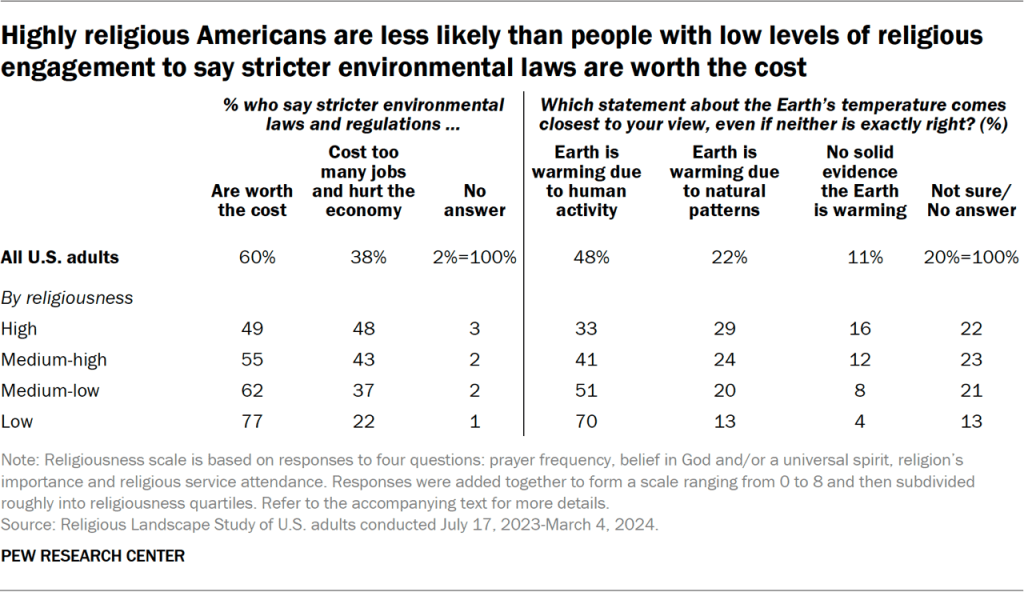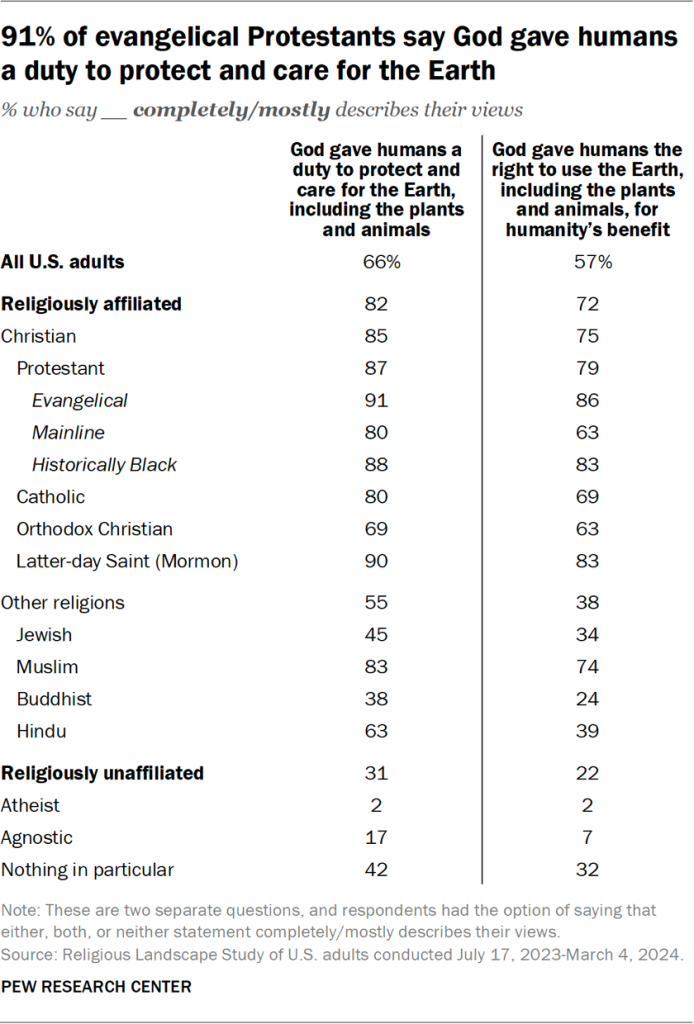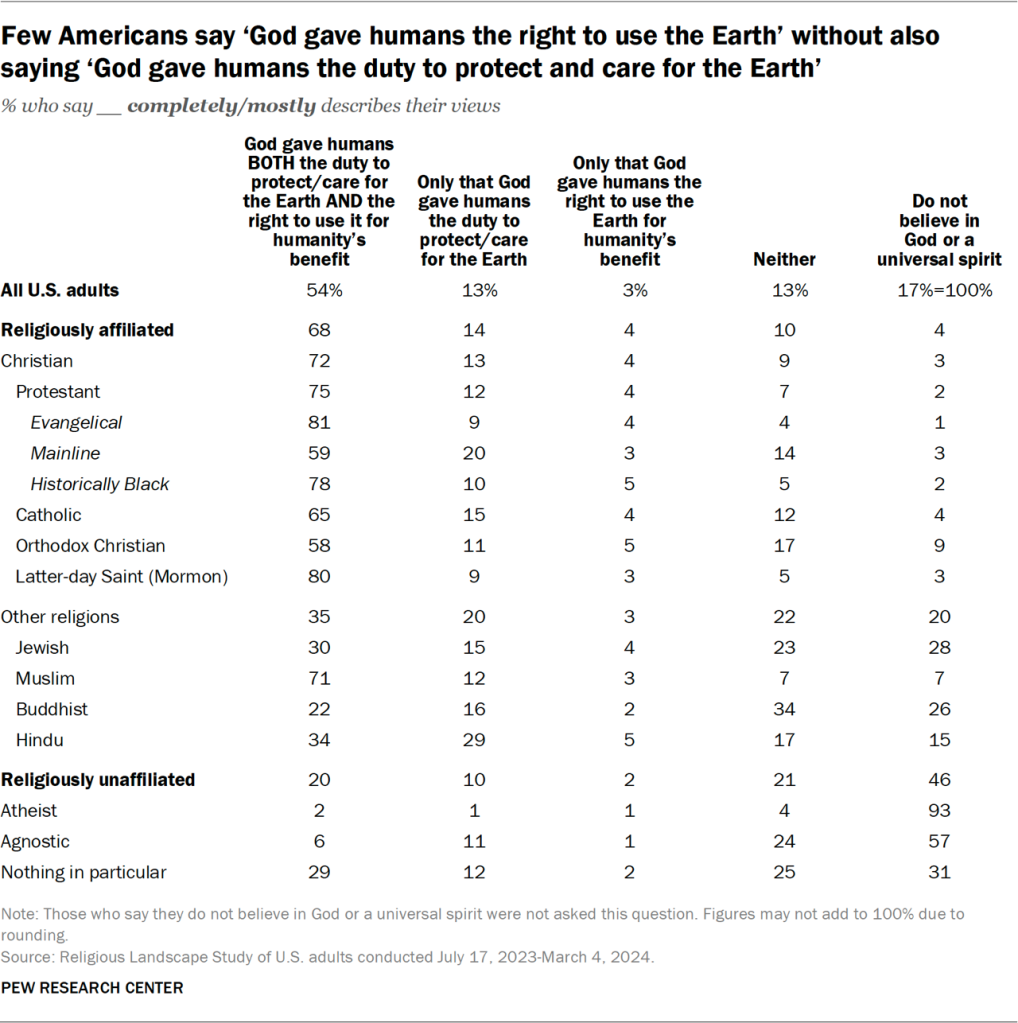Most U.S. adults believe that God gave humans a duty to protect and care for the Earth (66%), and 57% believe that God gave humans the right to use the Earth for humanity’s benefit, according to the 2023-24 Religious Landscape Study (RLS).

Highly religious Americans are the most likely to say that God gave humans a duty to protect and care for the Earth (94%) and that God gave people the right to use the Earth for humanity’s benefit (89%).
Few Americans with low levels of religious engagement believe that God gave humans a duty to protect the Earth or the right to use it for humanity’s benefit (largely because many people in these groups do not believe in God).73
The idea that “God gave humans a duty to protect and care for the Earth” is sometimes associated with the theological concept of “stewardship.” The notion that “God gave humans the right to use the Earth for humanity’s benefit” reflects more of a “dominionist” perspective.
Slightly more than half of Americans (54%) agree with both perspectives, saying that God has given humans a duty to care for the Earth and also a right to use it for humanity’s benefit. Just 3% say that humans have a right to use the Earth but do not have a duty to protect and care for it.

The survey also shows that Americans who are very religious are less likely than those with low and medium-low levels of religious commitment to view stricter environmental regulations as worth the cost, and to say that the Earth is getting warmer mostly because of human activity.
The differences between highly religious Americans and those who are not religious on these questions reflect big partisan differences between these groups. Indeed, prior research shows that the main driver of U.S. public opinion about the climate is political party, not religion.

Highly religious Americans tend to identify with or lean toward the Republican Party, and Republicans are less inclined than Democrats to support environmental regulations or to believe the Earth is warming because of human activity. People who are not religious tend to identify with or lean toward the Democratic Party, and Democrats are more inclined than Republicans to support environmental regulations, and to believe the Earth is warming because of human activity.
Read our previous study about religion and Americans’ attitudes on environmental issues.
Jump to sections on religious groups’ views about:
- Whether humans have a God-given duty to protect/use the Earth
- Whether stricter environmental regulations are worth the cost
- Climate change
Views on whether humans have a God-given duty to protect/use the Earth
All respondents who said they believe in God and/or a universal spirit were asked several questions that were not offered to others.
Specifically, we asked them how closely each of these statements reflect their own views: “God gave humans a duty to protect and care for the Earth, including the plants and animals,” and “God gave humans the right to use the Earth, including the plants and animals, for humanity’s benefit.”
(This was not a choice between the two statements. Respondents were able to say they hold both views or to reject both views.)

Two-thirds of U.S. adults say the notion that God gave humans a duty to protect the Earth completely or mostly describes their views. Slightly fewer (57%) say the notion that God gave humans the right to use the Earth completely or mostly describes their views.
Majorities of all religiously affiliated groups say God gave humans a duty to protect and care for the Earth – with the exceptions of Jews and Buddhists (who are less likely than other affiliated groups to believe in God).
And across the religiously affiliated groups, the view that God gave humans a duty to protect the Earth is generally more common than the view that God gave humans a right to use the Earth.
When we combine these questions, we find:
- Slightly more than half of Americans (54%) say humans have both a God-given duty to protect the Earth and a God-given right to use the Earth for humanity’s benefit.
- 13% affirm a God-given duty to protect the Earth but no God-given right to use the Earth for humanity’s benefit.
- Just 3% say humans have a God-given right to use the Earth without a duty to also protect it.
- 13% say neither of these statements completely or mostly describes their views.
- 17% of U.S. adults do not believe in God or a universal spirit (or didn’t answer the question about whether they believe in God); as a result, they were not asked the questions about whether God gave humans a right to use or a duty to protect the Earth.
Evangelical Protestants (81%); members of the Church of Jesus Christ of Latter-day Saints, who are widely known as Mormons (80%); and members of the historically Black Protestant tradition (78%) are among the mostly likely religious groups to affirm both a God-given duty to protect the Earth and a God-given right to use the Earth for humanity’s benefit.

Hindus (29%) and mainline Protestants (20%) are more likely than most other religious groups to say that humans have a God-given duty to protect and care for the Earth, without a God-given right to use the Earth.
Few Americans in any of the religious or nonreligious groups say that God gave humans a right to use the Earth for humanity’s benefit without also saying we have a duty to protect and care for the Earth.
Views on whether stricter environmental regulations are worth the cost
The 2023-24 RLS asked respondents to choose which of two statements comes closest to their view: “Stricter environmental laws and regulations cost too many jobs and hurt the economy,” or “Stricter environmental laws and regulations are worth the cost.”

Six-in-ten U.S. adults say stricter environmental regulations are worth the cost, while 38% say they cost too many jobs and hurt the economy.
The balance of opinion on this question is similar to what we found in the 2014 RLS, when 57% said environmental regulations are worth the cost and 38% said they cost too many jobs and hurt the economy. In 2007, 61% said environmental regulations are worth the cost and 30% said they cost too many jobs and hurt the economy.74
Atheists (87%) and agnostics (83%) are the most likely to support stricter environmental regulations. Evangelical Protestants (44%) and Latter-day Saints (46%) are among the least likely to say regulations are worth the cost. These differences correspond to broader political differences between these groups. Atheists and agnostics mostly identify with or lean toward the Democratic Party, and Democrats tend to support environment regulations. Evangelical Protestants and Latter-day Saints mostly identify with or lean toward the Republican Party, and Republicans are less supportive of environmental regulations.
Other religious groups lie somewhere between, but Americans who identify as Hindu, Jewish and Buddhist are more likely than Christians overall to say stricter environmental regulations are worth the cost.
Views on climate change
The survey also asked respondents to choose which of these three statements comes closest to their view: 1) “The Earth is getting warmer mostly because of human activity such as burning fossil fuels”; 2) “The Earth is getting warmer mostly because of natural patterns in the Earth’s environment”; or 3) “There is no solid evidence that the Earth is getting warmer.”

Overall, most respondents (70%) say the Earth is getting warmer, including 48% who say it is getting warmer mostly due to human activity and 22% who say it is getting warmer mostly due to natural patterns.
Atheists (83%), agnostics (78%) and Hindu Americans (81%) are the groups most likely to say the Earth is getting warmer mostly because of human activity.
In addition, Jews (65%), Buddhists (65%) and Muslims (60%) are more likely than Christians to say the Earth is getting warmer primarily due to human activity.
Among Christian subgroups, evangelical Protestants (28%) and Latter-day Saints (29%) stand out as being the least likely to believe the Earth is getting warmer mostly due to human activity.
Here again, these religious differences are in line with partisan gaps. The religious groups that are least likely to say they think the Earth is warming because of human activity are largely Republican and Republican-leaning groups. The religious groups that are most likely to say they think the Earth is warming because of human actions are largely Democratic and Democratic-leaning groups.




